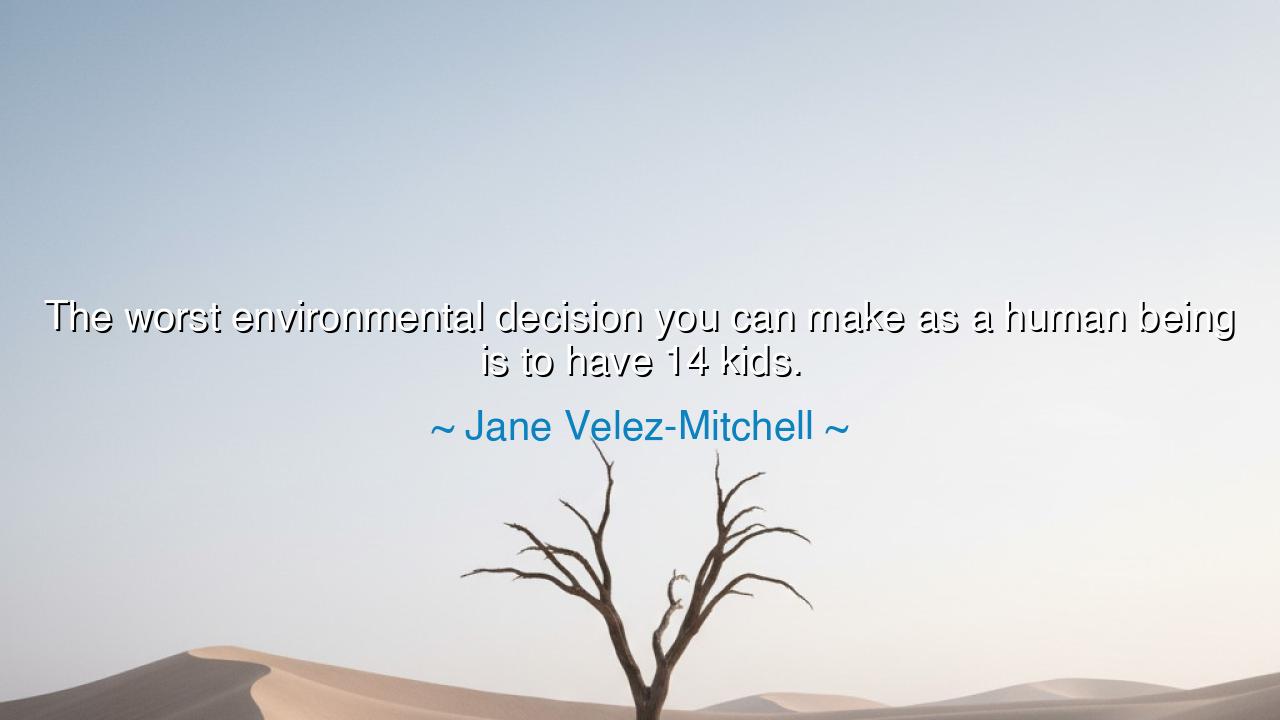
The worst environmental decision you can make as a human being is






The words of Jane Velez-Mitchell—“The worst environmental decision you can make as a human being is to have 14 kids.”—strike with the force of truth both uncomfortable and urgent. Beneath their bluntness lies a profound moral cry: that every human life, wondrous as it may be, carries a footprint upon the earth, and that the choices we make in bringing life forth are inseparable from the fate of the planet that sustains it. Velez-Mitchell speaks not in condemnation of parenthood, but in defense of the delicate balance between life and sustainability. Her words challenge us to awaken from the illusion of limitless abundance and to see, with sober clarity, that unchecked growth has consequences beyond ourselves.
The origin of this statement lies in Velez-Mitchell’s lifelong advocacy for animal rights, environmental justice, and compassionate living. As a journalist and activist, she has spent decades unveiling the hidden costs of modern consumption—the forests razed for livestock, the oceans choked by plastic, the air thickened by industry. Her reflection on overpopulation emerges not from cold calculation, but from compassion for all life forms sharing this fragile planet. She reminds humanity that the Earth is not an infinite giver; it is a living organism, finite and vulnerable, whose generosity has limits. To ignore those limits is to hasten the suffering of generations yet unborn.
The ancients, though they lived in smaller numbers, understood this truth intuitively. The Stoics spoke of living according to nature, of tempering desire to maintain harmony with the world. The Hindus saw all creation as a web of interdependence, where excess in one realm brings imbalance to all others. And the wise Taoists taught that abundance unrestrained becomes its own destruction—“When the cup is full, stop pouring.” Jane’s modern warning carries the same spiritual wisdom: that the duty of humankind is not endless expansion, but balance and reverence for the systems that give us breath, water, and sustenance.
History bears witness to the peril of ignoring this balance. In the early 20th century, as industrial nations grew unchecked, the hunger for land, energy, and resources multiplied. The Dust Bowl of the 1930s stands as a grim testament: the soil, overworked and overused to feed swelling populations, turned to dust and despair. Millions were displaced, not by war or conquest, but by their own excess. In the modern age, this same story plays out on a planetary scale—the Earth’s atmosphere and ecosystems strained by billions striving for comfort once reserved for the few. Velez-Mitchell’s statement reminds us that the greatest environmental challenges—climate change, deforestation, extinction—are magnified by sheer human number. Each additional life, though precious, demands food, water, shelter, energy, and space from a world already groaning under the weight of our needs.
And yet, her words are not a call to despair or denial of life’s beauty—they are a call to responsible creation. To bring a child into the world is a sacred act, but it is sacred precisely because it carries responsibility. The wise parent asks not, “How many can I bear?” but, “How many can I nurture without harming others—human, animal, or Earth itself?” In ancient tribes, families grew in accordance with the resources of their land, understanding instinctively that to take more than nature could give was to endanger all. Velez-Mitchell rekindles this forgotten wisdom: that to love the Earth is to love one’s children enough to ensure they inherit a world still capable of sustaining them.
There is also a deeper moral undercurrent to her words—a challenge to the modern obsession with consumption and legacy. In an age where success is often measured by possession or progeny, her statement turns the mirror upon humanity’s pride. To have many children may once have been a sign of strength, but now it is a test of conscience. For what strength is there in abundance that destroys its own source? True legacy is not in the number of descendants we leave, but in the quality of the world we leave behind for them. It is in the rivers we keep clean, the forests we preserve, and the air we keep breathable.
The lesson, then, is one of humility and foresight. We must remember that the Earth, though vast, is not infinite; that compassion must extend not only to the present but to the future. Let each person live mindfully—choose smaller families, adopt when possible, educate others about sustainability, and live simply so that others, both human and nonhuman, may simply live. The goal is not denial of life, but the preservation of life’s harmony.
So let these words of Jane Velez-Mitchell endure as a lantern in our age of excess: to give life wisely is the greatest form of love. For if humanity learns once again to measure prosperity not in numbers but in balance, then perhaps the Earth will breathe easier—and future generations will inherit not scarcity and ruin, but the fertile peace of a planet once more in harmony with its children.






AAdministratorAdministrator
Welcome, honored guests. Please leave a comment, we will respond soon